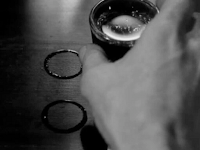Not Rated
This Best Picture winner is a dark and serious look at alcoholism, especially for its time. It was the first film to tackle this rather taboo subject and take a realistic approach in analyzing the disease, instead of using a stereotypical “comic” drunk as in other previous movies. The story takes place over a period of five days (a lost extended weekend, so to speak) with a few flashbacks for clarification and character history. It follows Don Birnam who is a self-tortured alcoholic and an unsuccessful writer on his own account, over which he also tortures himself.
The screenplay was based on the best-selling novel with the same name but apparently a little different and less hopeful, “happy ending”. Birnam meets and falls in love with Helen St. James, a woman who after finding out his secret, stands by him to help him reform and encourages him to write a novel as a form of cathartic therapy. Birnam will go to any lengths to hide his addiction, even hiding bottles in his chandelier and hanging out of his window. After one particular and intense binge near the end of the film, Birnam hallucinates a disturbing image. The next morning, hung-over, he walks down the street to pawn his girlfriend’s animal print coat. I won’t tell you what he pawns it for… you’ll have to see it for yourself. (But I will say I was a little pleased to get the coat out of the picture- it was hideous and made Helen look like a linebacker.) When Helen comes into his apartment afterwards to save him, I didn’t know whether to think she was naïve, stupid, or smart. Nonetheless, I was satisfied with the way it ended.
This film brought a new awareness of alcoholism to society that audiences hadn’t seen on film before. It also had an impact on soldiers returning home from WWII who were struggling to adapt to civilian life after the hardships and trauma of war. Hopefully, family members and loved ones of those who suffer(ed) with this illness will not be disheartened by the intensity and depth of it, but instead, find some means of hope and perseverance.
“The Lost Weekend” was up against “Anchors Aweigh” (a musical), “Mildred Pierce” (a film noir), “Spellbound” (a thriller by Hitchcock), and “The Bells of St. Mary’s” (the musical sequel to the Best Picture winner I’ve already blogged about: “Going My Way.”) It won four of its seven nominations, including Best Actor which was well deserved.
MEMORABLE LINES:
Near the beginning, Don Birnam cons his girlfriend and his brother into seeing a show without him while he sneaks off to a bar. The bartender tries to wipe away the water marks left on the counter from the shot glass and Don replies, “Don't wipe it away, Nat. Let me have my little vicious circle. You know, the circle is the perfect geometric figure. No end, no beginning.” That is obviously how he sees his addiction. There’s no way out. It’s who he is now. It’s hopeless.
This next line is silly… A woman named Gloria (who reminded me an awful lot of Ana Gasteyer from Saturday Night Live) is flirting with Don at the bar. He jokes with her and she shoots back, “Don’t be ridic’.” I laughed out loud because I thought this was something the kids were saying just nowadays, but apparently not. (She has a few more lines too where she shortens her words like “don’t mench”; they’re pretty funny.)
This last one I’m paraphrasing because I can’t remember it verbatim. Don’s girlfriend Helen comes back to him even though he’s deliberately trying to scare her away and tells her to leave his apartment. She yells back, “Why? Because I’ve got a rival? You’re in love with it aren’t you?” I thought it was an interesting choice of words: rival. But that’s just what it is. The bottle is his top priority and gets his undivided attention. She has to find a way to beat it out for first billing in his mind and heart so she can start to really reason with him.
LESSONS LEARNED:
Don’t give up on loved ones. Don’t give up on yourself. Pretty self-explanatory.




No comments:
Post a Comment